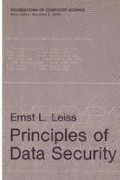Abstract
Suppose two persons, A and B, wish to communicate, i.e., exchange messages. At first glance it appears that this is an easy enough task. Unfortunately, this appearance may be quite deceptive. The following problems arise:
-
(1)
How can A and B make sure that nobody else can receive these messages?
-
(2)
How can A (B) make sure that B (A) receives all of A’s (all of B’s) messages?
-
(3)
How can A and B make sure that they receive only these messages and no others?
Access this chapter
Tax calculation will be finalised at checkout
Purchases are for personal use only
Preview
Unable to display preview. Download preview PDF.
Author information
Authors and Affiliations
Rights and permissions
Copyright information
© 1982 Plenum Press, New York
About this chapter
Cite this chapter
Leiss, E.L. (1982). Cryptosystems. In: Principles of Data Security. Foundations of Computer Science. Springer, Boston, MA. https://doi.org/10.1007/978-1-4684-4316-5_4
Download citation
DOI: https://doi.org/10.1007/978-1-4684-4316-5_4
Publisher Name: Springer, Boston, MA
Print ISBN: 978-1-4684-4318-9
Online ISBN: 978-1-4684-4316-5
eBook Packages: Springer Book Archive

